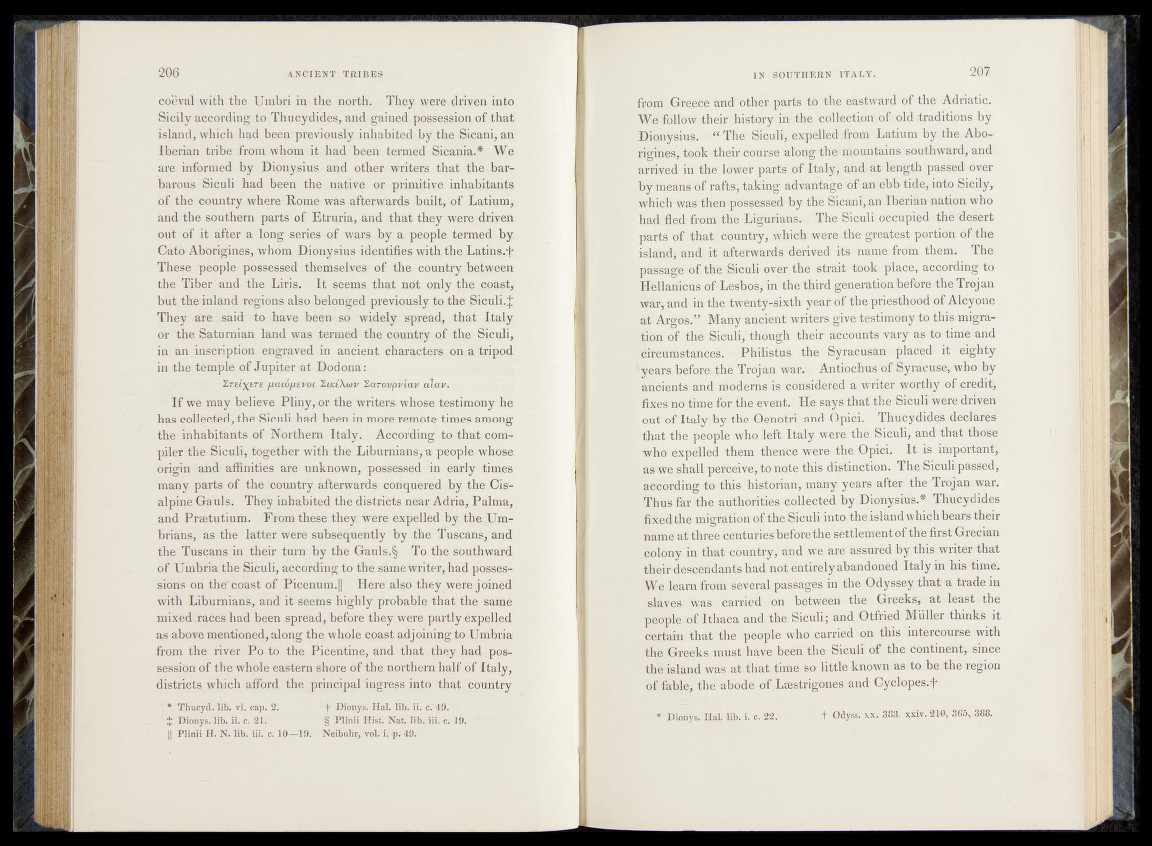
eoëval with the Umbri in the north. ■ were d,rif en » to
Sicily according to Thucydides, and gained possession of that
island, which had been previously inhabited by the Sicani, an
Iberian tribe from whom it had been termed Sicani'a.* We
are informed by Dionysius and other writers that the barbarous
Siculi had been the native or primitive inhabitants
of the country where Rome was afterwards built, of. Latium,
and the southern parts of Etruria, and that they were driven
nut of it after a long series of wars by a people termed by
Gato Aborigines, whom Dionysius identifies with the Latins.f
These people possessed themselves of the country between
the Tiber and the Liris. It seems that not only the coast,
but the inland regions also belonged ^previously to the Siculi.J
They are said* to have been so widely spread, that Italy
Or the Saturnian land was termed the country of the Si.cuji,
in an inscription engraved in ancient chai^c|ela><yk.%-ta%!|9^
in the temple of Jupiter at Dodona:
ErEtyere fia ió fie v o t EikÉXiov 'Za.TOvpviav a la v . J
I f we may believe Pliny, or the writers- whose testimony he
has collected, the Siculi had been in more remote times among
the inhabitants of Northern Italy. According to th a t compiler
the Sreuliy together with the Liburnians, a people whose
origin and affinities are unknown, possessed in early times
many parts of the country afterwards conquered by the Cis*
alpine Gauls. They inhabited the districts near Adria, P a lm a ,,
and Praetutium. From these they were expelled by thes^pm-
brians, ;as the latter were subsequently by the Tuscans, and
the Tuscans in their turn- by the Gauls.§ To thet south ward
of Umbria the Siculi, according to the same writer, had possessions
on the*coast of Picenum.J| Here also they were joined
with Liburnians, and it. seems highly probable th a t the same
mixed races had been spread, before they were partly expelled
a s above mentioned, along the whole coast adjoining to. Umbria
from the river Pó to the Picentine, and th at.they had possession
of th é whole eastern shore of the northern half of Italy,
districts which afford the principal ingress into that country
* Thucyd. lib. vi. cap. 2. f Dionys. Hal. lib. ii. cT£9.
t Dionys.libvii.c. 2 1 . ' § PIMi Hist. Nat. lib. iii. c. 19.
|| Plinii H. N. lib. iii. c. 10—19. Neibuhr, vbl. £ p. 49.
from Greece and other parts to the eastward of the Adriatic.
We fdlldW?their-history1 in the-'collectionf'af old traditions by
Dionysius. \*\ T h eA lili, expetledvjfrom Latium by the Aborigines,
took their Course along« the mountains ^southward, and
arrived -in the'1 lower parts-of Italy^and, afderigth passed over
byme'ak&bf rafts, taking advaA^a^e o f an ebb tide, into Sicily,
which was theif-pQ's$esSed'by the Sicani,.an Iberian nation who
had fled? from; the Ligurians. The Siiculi; occupied the desert
parts of thaU country, wBirffcwere thcg^eatest-portioiirof the
island, and it afterwards derived its name from them. The
»passage-of the Siculiover the sttairi-took place,-according* to
Hellanicus,©f Lesbos? in the third generation beforefthe Troj an
war, and in the twenty-gixth yearpf the priesthood df Alcyone
atl Argo's.” Many ancieriti'writer^gW^te^'m'on.y to this migration
of-the- Siculi, though^ theiriac&Mnts-wafy as-to time and
circumstances; H P-hflistfis' the Syracusan ^laded-rit > eighty
iyears- before-«the Troj an war; | Aii.tiochus;of Syrfcime, .whd -by
~a#Sients and* modern^rs^eonside^d^ajw'riter worthy ^of credig
fixes!®!) 4Mlb8fithe-ev:eiit; s' HdsAys that ?th elS'ieul i w eredriven
^ out o f Italy; by the^Ofenotri and -Opicbif Thucydides'declares
that j)le who^feft Italy 'were and that those
who exipelieff them thence wereathe Opici. .It. ^important;,
as we shall perceive, to'note, this distinction. The Siculispas^ed,
; A&cofdihg-'fco this historian, many years after the Troj any war.
Thus far the authorities-eollected by Dionysius.* Thufcydides
fi^edthe migration of the Siculi into- thedsland which bears their
name at threbhenturies befo'rethe^ettlement ofcthe first Grecian
colony- in that Country, and we are assured-by..this .writer that
their descendants had not entirelyabandonedcltaly in his time.
We learn from several passages in-the; Gdyssdy th a t a trade in
slaves- w.as carried on between-'the-Greeks, a t least the
people!ofi'Ithaca and the.Siculi; and Ot-fried Muller thinks it
certain that the- people -who carridbon this intercourse with
the Greeks must have-, been the j-Siculi of the continent, since
the island -was a t that time sqrijttle known us to -bevthe region
of fable, the abode of Laestrigones and" G^clopes.f ■
Dionys. Hal. lib. |fe j2 2 . + :Odyss. xxl 383. xxiv. 210, 365, 388.